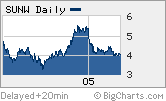 |
| Cloudy skies: Shares of Sun Microsystems have done little to excite investors during the past year. |
|
|
|
|
|
| �* based on prices as of 4/11/05 | | �Source:��Thomson/Baseline |
|
|
| More about Sun Microsystems
|
|
|
|
|
NEW YORK (CNN/Money) � Wait until next year. It's the rallying cry of fans of downtrodden sports teams. It also could be the motto of beleaguered Sun Microsystems.
Sun has been telling investors that it has turned a corner for several years now but despite some progress, it still has little to show Wall Street. The stock has bounced around in a range between $3 and $6 a share since the beginning of 2003 and currently sits at about $4.
The company will report its fiscal third quarter results Thursday and analysts are predicting a lackluster showing. Sun (Research) is expected to break even on a little more than 3 percent revenue growth.
"Sun's problem is a lack of sustainable revenue growth," said Melanie Hollands, president of Koala Capital, a New York-based hedge fund that focuses on technology stocks and does not have a position in Sun. "As a result, Sun is not a great value stock for long-term investors."
But Sun does have something that a lot of other beaten-down techs do not: a sizable war chest of about $7.5 billion in cash and investments.
Sun has been using some of that to invest in new technologies, spending nearly 16 percent of revenue last quarter on R&D. "I like the R&D pipeline and the strength of its balance sheet," said Bill Nygren, manager of the Oakmark Fund, which owns shares of Sun Microsytems.
Software shopping spree for Sun?
But some think Sun should use some of its cash to make acquisitions to further increase its presence in software, a market that has more attractive growth prospects and higher profit margins than the cutthroat business of selling servers.
After all, the company sent a clear signal to Wall Street last year that it was serious about becoming bigger in software when it promoted Jonathan Schwartz, the company's software guru, to president and chief operating officer. Presumably, that puts him in line to eventually succeed Sun co-founder Scott McNealy as CEO.
"The software business is increasingly important for Sun. I do anticipate they'll continue to make acquisitions there," said Dion Cornett, an analyst with Decatur Jones Equity Partners, an independent research firm. "That needs to be part of the strategy."
Sun has already done deals for several small private companies, most notably storage software firms Pirus Networks in 2002 and Centerrun in 2003 as well as security software developer Waveset Technologies in 2003.
Cornett sees Sun making more forays into the storage, security and data management software realms, adding that speculation about Sun going after a Linux software developer such as Red Hat (Research) or Novell (Research) makes "absolutely no sense."
For one, Sun rival IBM (Research) owns a stake in Novell and would probably not be interested in seeing its investment sold to a rival. Plus, Sun has spent a lot of money promoting its Solaris operating system as an alternative to Linux, so such an acquisition would be a major shift in strategy, Cornett said.
Michael Mahoney, managing director of EGM Capital, a San Francisco-based hedge fund specializing in technology stocks, added that software deals could help Sun boost its support and consulting services business, which now accounts for more than a third of Sun's total sales.
"With all that cash, if they bought software that enhances their services business, that could be an interesting strategy," Mahoney said, adding that Dot Hill Systems (Research), which Sun already has a partnership with, and Xyratex (Research), are two public storage software and hardware firms that could make a good fit for Sun.
He also said that Quest Software (Research) could be attractive to Sun on the data management front. Mahoney's firm does not have a position in these stocks.
Another analyst who asked not to be named also said Sun is likely to make more software deals. "Sun does want to be a consolidator in a consolidating industry. Investors aren't paying them to be a bank," the analyst said.
This analyst added that he's hopeful Sun will be able to do a better job of making money from its popular Java web-services software. There are plenty of ways for Sun to expand the use of Java, particularly in the mobile devices market.
As such, Sun purchased a small company called Pixo, which develops Java software that wireless carriers use to distribute ringtones, games and other multimedia content on cell phones, in 2003.
Still, Sun doesn't say how much of its revenue comes from software in its earnings reports. And until the promise of Sun's software business translates into meaningful sales, it's going to be tough for Wall Street to get tremendously excited about the stock....especially since it isn't cheap. Sun trades at 40 times fiscal 2006 earnings estimates.
And Koala's Hollands adds that if Sun doesn't start to show signs of a real turnaround in the near future, rumors of it being a takeover target could resurface again. "The solution for Sun might not be to buy someone else but to sell themselves."
For a look at Sun and other hardware stocks, click here.
For more about consolidation in the software industry, click here.
Analysts quoted in this story do not own shares of the companies mentioned and their firms have no investment banking relationships with the companies.
The writer of this story owns shares of the Oakmark Fund through his company's 401(k) plan.
Sign up to receive the Tech Investor column by e-mail.
Plus, see more tech commentary and get the latest tech news.

|